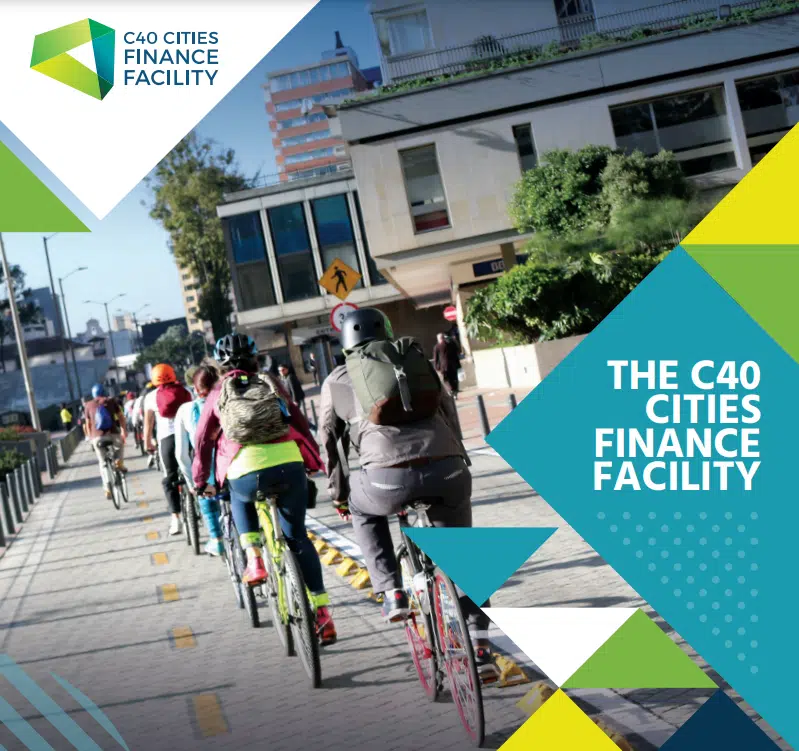By Andrej Frizler
“If I get on a crowded bus, I risk infection with COVID-19”.
This vague feeling impacted urban transport around the world in 2020, causing decreased used rates of up to 96% – despite evidence that public transportation is safe if precautions are taken.
Despite this, the C40 Cities Finance Facility (CFF) 17 partner cities and many more around the world are still committed to protecting, improving and expanding their zero-carbon transit options and sharing their experiences with others. In this spirit, we want to give you an overview of CFF’s recent transport activities, hoping that it can help support your projects and partners too!
First, active transport has been one of the few ‘winners’ of the Covid-19 pandemic, with many cities observing large increases in rates of walking and cycling around the world, with cities such as Mexico City noting that their rates of cycling increase by 200% since the pandemic started. The CFF has been able to continue to help support this, through a variety of activities on cycling:
- Exchange of experiences that can help medium and small cities in the Latin America to implement their plans to implement bike share systems. Presentations and the recordings are available in Spanish (here and here) and Portuguese (here and here).
- The development of a report looking at the multitude of financing and funding options available within Latin America to support the deployment of large-scale bike sharing systems, demonstrating that it is not necessary to resort to public investment or subsidies, as private sector companies are able to cover both the capital and operating costs of a bike-sharing system. You can find the report in English, Spanish or Portuguese.
- A brief looking at the impact of the Medio Milenio cycle avenue in Bogotá, Colombia.
- The City of Tshwane and the CFF co-hosted a virtual Indaba which focused on growing the footprint of walking and cycling in Tshwane and South Africa. The event aimed at building alliances, empowering more voices and co-creating a vision for walking and cycling in the capital city. You can find details of the Indaba here and here.
Second, despite the falling user-fares significantly impacting the balance sheets of both transit authorities and operators as a result of the pandemic, many cities are still looking at how to decarbonise their transportation fleet to address the climate crisis and protect their citizens from poor air quality which studies have suggested can lead to higher Covid-19 rates. The CFF has been able to continue to help support this, through a variety of activities on zero-emission busses:
- In Indonesia and South East Asia: The CFF in collaboration with ITDP and the City of Jakarta organised four high-level webinars. The series focused on elements including pilot planning, business case development, technology and green financing. Presentations and recordings are here.
- In Ecuador: The CFF organised a 5-part webinar series for Ecuadorian cities providing in-depth insights in some of the key areas that cities need to consider, including: technology analyses, measuring transport demand, financial model creation, measuring environmental benefits and integrated transportation planning. Presentations and videos in Spanish are here, also for the final co-creation workshop here.
- In Mexico: The CFF developed a workshop focusing on how Mexican cities can deploy zero-emission buses. It covered the economic, environmental and health benefits of zero-emission bus adoption, institutional coordination, financial options in Mexico, inclusive transportation planning principles, pilot planning and long-term action planning. The presentations in Spanish are here.
- On charging: The CFF developed a report which aims to provide city officials and practitioners with an understanding of the key elements and considerations in determining an appropriate and cost-effective charging system for the deployment of zero-emission buses drawing on analyses conducted in Jakarta by the CFF. This report is the first iteration, with a final version planned for early 2021. You can find the report here.
- The CFF co-developed a ‘spotlight’ on zero-emission buses alongside the C40 Cities Climate Leadership Group (C40). This mini-platform includes a whole range of resources, including why the transit authorities of Santiago de Chile, Jakarta, Toronto and Vancouver are still committed to zero-carbon transit despite Covid-19. All research reports, data visuals, case studies and implementation are here.
Finally, the CFF’s successful approach won a UN Global Climate Action Award, in the category “Financing for Climate-Friendly Investment”. On the 5th anniversary of the Paris Agreement, UN Secretary General Antonio Guterres recognised the CFF as one of 13 innovative models to drive climate action. With this motivational push, the entire CFF team looks forward to working with you in 2021!
The C40 Cities Finance Facility is implemented by GIZ and the C40 Cities Climate Leadership Group (C40) and funded by the German Federal Ministry for Economic Cooperation and Development (BMZ), Children’s Investment Fund Foundation (CIFF), UK department for Business, Energy and Industrial Strategy (BEIS) and The United States Agency for International Development (USAID).
Contact Persons: owalker@c40.org / andrej.frizler@giz.de
